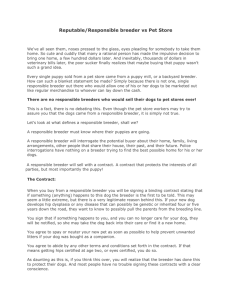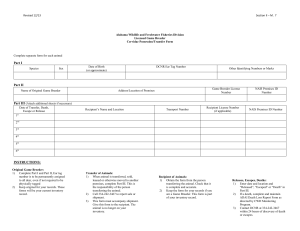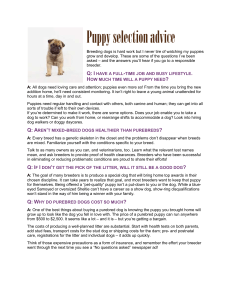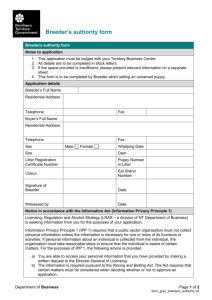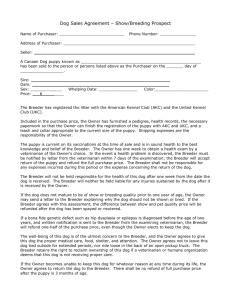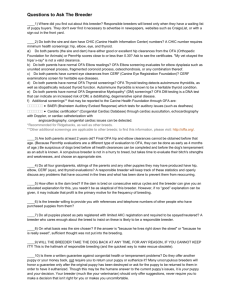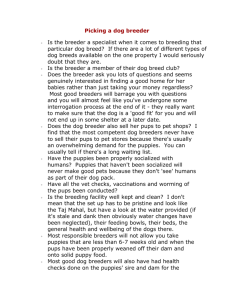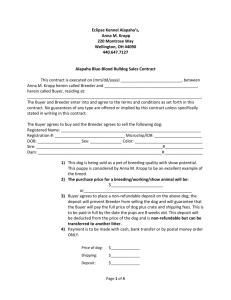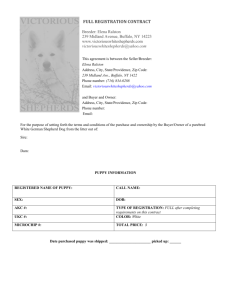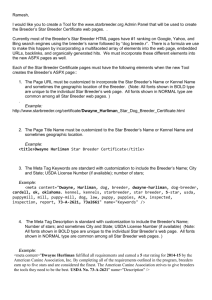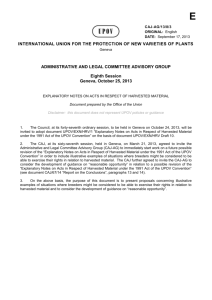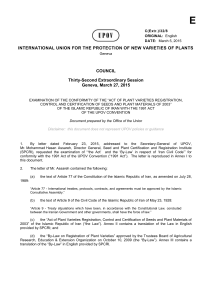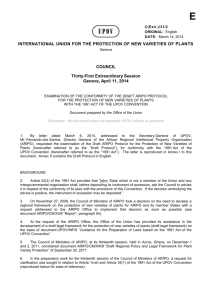Questions to ask the breeder BEFORE you buy a puppy
advertisement
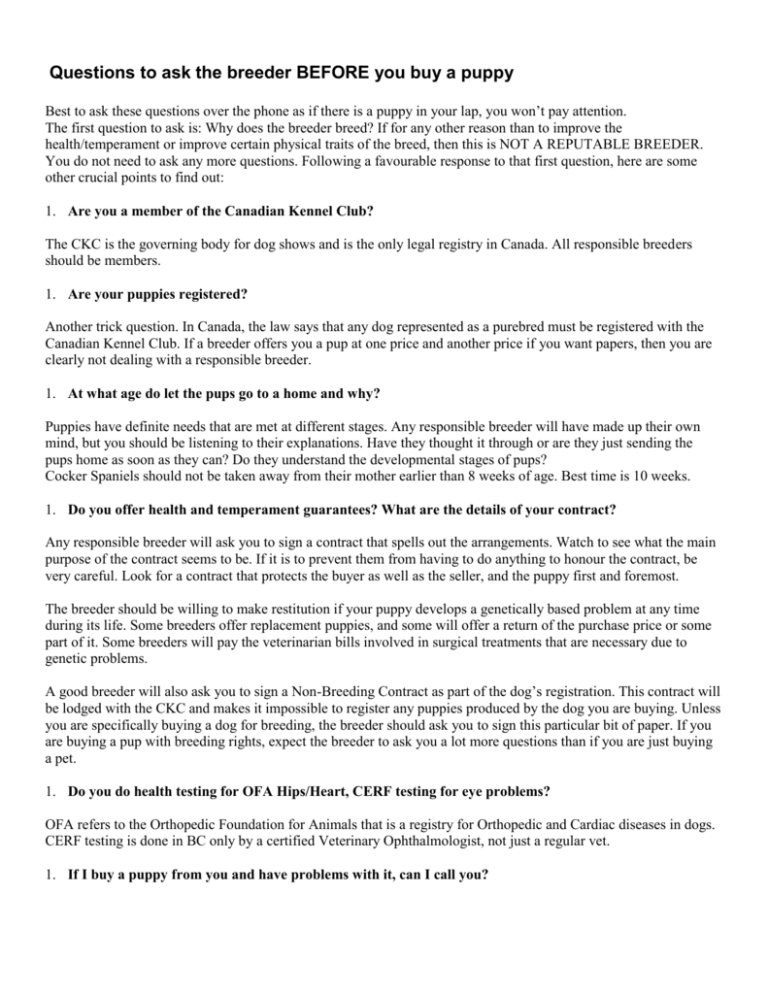
Questions to ask the breeder BEFORE you buy a puppy Best to ask these questions over the phone as if there is a puppy in your lap, you won’t pay attention. The first question to ask is: Why does the breeder breed? If for any other reason than to improve the health/temperament or improve certain physical traits of the breed, then this is NOT A REPUTABLE BREEDER. You do not need to ask any more questions. Following a favourable response to that first question, here are some other crucial points to find out: 1. Are you a member of the Canadian Kennel Club? The CKC is the governing body for dog shows and is the only legal registry in Canada. All responsible breeders should be members. 1. Are your puppies registered? Another trick question. In Canada, the law says that any dog represented as a purebred must be registered with the Canadian Kennel Club. If a breeder offers you a pup at one price and another price if you want papers, then you are clearly not dealing with a responsible breeder. 1. At what age do let the pups go to a home and why? Puppies have definite needs that are met at different stages. Any responsible breeder will have made up their own mind, but you should be listening to their explanations. Have they thought it through or are they just sending the pups home as soon as they can? Do they understand the developmental stages of pups? Cocker Spaniels should not be taken away from their mother earlier than 8 weeks of age. Best time is 10 weeks. 1. Do you offer health and temperament guarantees? What are the details of your contract? Any responsible breeder will ask you to sign a contract that spells out the arrangements. Watch to see what the main purpose of the contract seems to be. If it is to prevent them from having to do anything to honour the contract, be very careful. Look for a contract that protects the buyer as well as the seller, and the puppy first and foremost. The breeder should be willing to make restitution if your puppy develops a genetically based problem at any time during its life. Some breeders offer replacement puppies, and some will offer a return of the purchase price or some part of it. Some breeders will pay the veterinarian bills involved in surgical treatments that are necessary due to genetic problems. A good breeder will also ask you to sign a Non-Breeding Contract as part of the dog’s registration. This contract will be lodged with the CKC and makes it impossible to register any puppies produced by the dog you are buying. Unless you are specifically buying a dog for breeding, the breeder should ask you to sign this particular bit of paper. If you are buying a pup with breeding rights, expect the breeder to ask you a lot more questions than if you are just buying a pet. 1. Do you do health testing for OFA Hips/Heart, CERF testing for eye problems? OFA refers to the Orthopedic Foundation for Animals that is a registry for Orthopedic and Cardiac diseases in dogs. CERF testing is done in BC only by a certified Veterinary Ophthalmologist, not just a regular vet. 1. If I buy a puppy from you and have problems with it, can I call you? The answer to this should be a resounding ‘yes!’ with some implication that they’ll be quite upset if you don’t! Good breeders want their pups to do well and want to keep contact with owners so that they can be sure the dog is doing well. It is in their best interest to make sure you and your pup are getting along and are happy together. Breeders should also be willing to refer you to other people when your questions go beyond their ability to answer. They will almost certainly refer you to an obedience trainer and a vet if you live in the same area that they do. They may know of good vets near you even if they themselves do not live near you. The breeder should also be willing to help, should something happen to you and the dog needs a new home. Some breeders insist that you not sell the dog without giving them the opportunity of first refusal. There are many different ‘what if..’ situations and the breeder passes if they are willing to be involved in order to ensure the pup has a good and loving home. 7. Ask for references The breeder may well ask you for references, and you should feel free to ask them for references as well. They should include their current veterinarian, several people who’ve bought puppies from them before and possibly other breeders. If this is their first litter, get the name of the breeder that they got their own dog or dogs from. Make sure you actually contact their references. Ask them open-ended questions that require more than a yes or no answer. Let them ramble on about the breeder and pay close attention to inconsistencies between what they say and the things the breeder says. Top Five Tips for Purchasing an Animal 1) Meet the parents; often the sire is offsite but insist on meeting the dam. If she is cowering under the table, growling; leave. It’s not the temperament you would want in a pet. 2) Avoid breeders who breed more than just one or two breeds or have more than three to four litters a year. Anything more than that and it likely a puppy mill, where profit can often take precedent over the health of animals. 3) Demand Orthopedic Foundation of America (OFA) clearance of any adults in the breeding line. X-rays are used to review joint issues, like dysplasia, on adult dogs. Don’t let the breeder say the puppies have had OFA clearance because they’re too young! Dogs must be at least nine months old before getting OFA x-rays. That’s why you need to get clearances on several generations of the parents. 4) Make sure your breeder has a long track record of happy customers and healthy dogs. Most dogs/cat hobbyists regularly compete in professional events. 5) Never, never buy an animal, sight unseen, off the Internet. Buy locally from people, who have a reputation to uphold.

